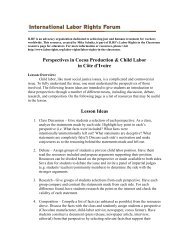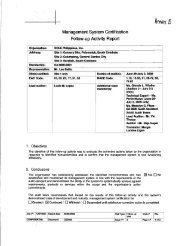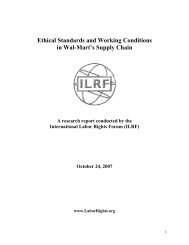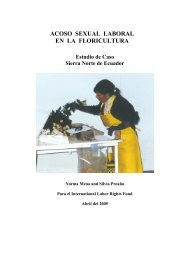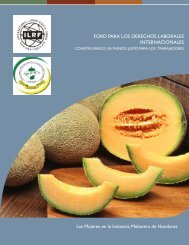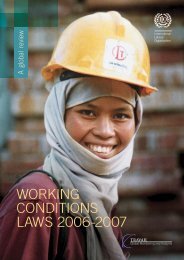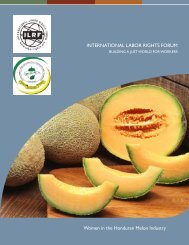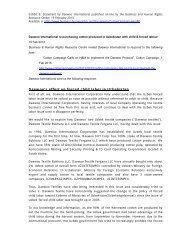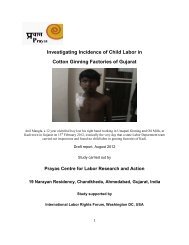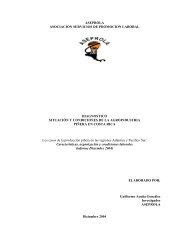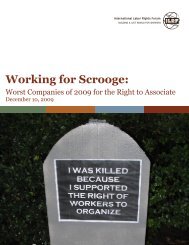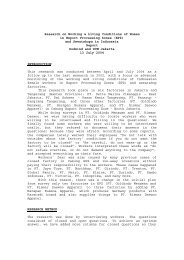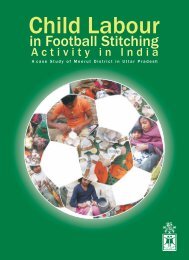ILRF Testimony re Dole Packaged Foods Petition 10-2008.pdf
ILRF Testimony re Dole Packaged Foods Petition 10-2008.pdf
ILRF Testimony re Dole Packaged Foods Petition 10-2008.pdf
You also want an ePaper? Increase the reach of your titles
YUMPU automatically turns print PDFs into web optimized ePapers that Google loves.
International Labor Rights Forum<br />
2001 S St<strong>re</strong>et NW, Suite 420, Washington, DC 20009<br />
TESTIMONY OF BRIAN CAMPBELL<br />
ATTORNEY, INTERNATIONAL LABOR RIGHTS FORUM<br />
befo<strong>re</strong> the Trade Policy Staff Committee<br />
at the Office of the United States Trade Rep<strong>re</strong>sentative<br />
In Re: <strong>Dole</strong> <strong>Packaged</strong> <strong>Foods</strong>, LLC petition to add pineapple juice (not concentrated)<br />
HTSUS 2009.41.20 and 2009.49.20), Cases 2008-08 and 09.<br />
October 20, 2008<br />
I would like to thank the Committee for providing us the opportunity to testify <strong>re</strong>garding<br />
<strong>Dole</strong>’s petition to expand the GSP to include pineapple juice.<br />
As envisioned by Cong<strong>re</strong>ss, the purpose of the GSP program is to “promote the notion that<br />
trade . . . is a mo<strong>re</strong> effective . . . way of promoting broad-based sustained economic<br />
development.” 1 Internationally <strong>re</strong>cognized workers rights, particularly the right to form<br />
unions and bargain collectively to achieve higher wages and better working conditions, is<br />
“essential for workers in developing countries to attain decent living standards and to<br />
overcome hunger and poverty” and “an important means of ensuring that the broadest<br />
sectors of the population . . . benefit from the GSP program.” 2 The<strong>re</strong>fo<strong>re</strong>, when taking<br />
action on a product petition, this Committee is instructed to examine “whether or not such<br />
country has taken or is taking steps to afford workers in that country (including in any<br />
designated zone in that country) internationally <strong>re</strong>cognized workers’ rights.” 3<br />
<strong>Dole</strong> produces most of its pineapple products at its 24,000 ac<strong>re</strong> plantation and processing<br />
plant in Mindanao, Philippines, whe<strong>re</strong> <strong>Dole</strong>’s workforce of around 6000 full-time employees<br />
and around 14,000 contract labo<strong>re</strong>rs dedicating their lives to producing wealth for <strong>Dole</strong> and<br />
its family of companies. However, <strong>Dole</strong>’s workforce is p<strong>re</strong>vented from fully enjoying the<br />
benefits of the internationally <strong>re</strong>cognized workers’ rights, including the right to f<strong>re</strong>edom of<br />
association and the right to acceptable conditions at work.<br />
First, many workers a<strong>re</strong> outright denied right to join a union. Since the late 1980s, <strong>Dole</strong>’s<br />
business model and expansion plans have <strong>re</strong>lied on outsourced and contracted labor.<br />
Unlike <strong>re</strong>gular workers, these workers a<strong>re</strong> underpaid, deprived of union benefits, and left<br />
in constant job insecurity. 4 Many have also been stripped of their lands. 5 Contractual<br />
1 See General Systems of P<strong>re</strong>fe<strong>re</strong>nces Renewal Act of 1984, P.L. 98-573, 98 Stat. 3019<br />
2 See General Systems of P<strong>re</strong>fe<strong>re</strong>nces Renewal Act of 1984, House Report No. 98-<strong>10</strong>90, 1984 U.S.S.C.A.N.<br />
5<strong>10</strong>1, 5111 (October 1984).<br />
3 See 19 USC §§2463(1), 2462(c)(7).<br />
4 Field <strong>re</strong>search conducted by <strong>ILRF</strong> partners in the provinces of Sultan Kudarat, South Cotabato and<br />
Saranggani between June 2006 and June 2007. Primary data-gathering included surveys, interviews, and
pineapple harvesters who labor for <strong>Dole</strong> a<strong>re</strong> paid on average a me<strong>re</strong> US $1.86 per day,<br />
nearly th<strong>re</strong>e times less than the Filipino minimum wage. 6 Outsourcing labor, which is<br />
intended to deprive most of its workforce the benefits of f<strong>re</strong>edom of association and<br />
acceptable conditions at work with <strong>re</strong>spect to minimum wage and hours of work, a<strong>re</strong><br />
di<strong>re</strong>ctly contrary to the development goals GSP program seeks to promote. 7<br />
Second, workers a<strong>re</strong> th<strong>re</strong>atened and intimidated by the anti-union tactics employed in and<br />
around <strong>Dole</strong>’s personal special economic zone. Both the Philippine Government and <strong>Dole</strong><br />
a<strong>re</strong> undertaking significant efforts to intimidate and harass workers and their democraticallyelected<br />
<strong>re</strong>p<strong>re</strong>sentatives.<br />
The Armed Forces of the Philippines is engaged in systematic anti-union activities at <strong>Dole</strong><br />
intended to intimidate workers and malign the union leadership. According to Major Medel<br />
Aguilar of the AFP, the military’s “job is to protect f<strong>re</strong>e enterprises as mandated by the<br />
p<strong>re</strong>sident’s policy of fo<strong>re</strong>ign investment and <strong>re</strong>source development.” 8 To achieve these<br />
objectives, the Armed Forced of the Philippines (AFP) 27 th Infantry Battalion is assigned to<br />
protect <strong>Dole</strong> Philippines’ operations from possible terrorist th<strong>re</strong>ats. According to the AFP,<br />
though, one of the terrorist th<strong>re</strong>ats is the workers’ own democratically elected union<br />
<strong>re</strong>p<strong>re</strong>sentatives, AK-NAFLU-KMU, or Amado Kadena. According to Lt. Col. Ricardo<br />
Santiago of the 27 th IB, <strong>Dole</strong> has been “infiltrated by” the KMU, which the AFP alleges is a<br />
front for the New Peoples’ Army. As this committee is awa<strong>re</strong>, these a<strong>re</strong> serious accusations<br />
which have lead, in other contexts, to the death or disappearance of union members.<br />
<strong>Dole</strong>’s Philippines operations we<strong>re</strong> not “infiltrated” by the union, Amado Kadena. The<br />
union was democratically-elected by <strong>Dole</strong>’s full-time workers. Despite this, the 27 th IB<br />
continues to conduct “information drives”, which is often a euphemism for harassing <strong>Dole</strong><br />
workers, to combat the union at the <strong>Dole</strong> facilities, di<strong>re</strong>ctly interfering with the <strong>Dole</strong>’s<br />
workers’ right to f<strong>re</strong>ely choose their own union without government intervention. 9<br />
<strong>Dole</strong> also engages in anti-democratic efforts to intimidate the union and the workers the<br />
union <strong>re</strong>p<strong>re</strong>sents through abuse of the legal system and taking advantage of weak labor law<br />
enforcement. In particular, we a<strong>re</strong> very concerned that <strong>Dole</strong> Philippines has filed criminal<br />
charges against one of Amado Kadena’s union leaders stemming from one p<strong>re</strong>ss <strong>re</strong>port<br />
about a union rally at <strong>Dole</strong>’s facility whe<strong>re</strong> participants discussed pollution from <strong>Dole</strong>’s<br />
operations and its impact on the local community. Now, that union leader, if convicted<br />
under the Philippines’ strict criminal libel laws, faces 4 years in prison or mo<strong>re</strong>, even if the<br />
pollution allegations a<strong>re</strong> true. Unfortunately, criminal charges, like libel and sedition, a<strong>re</strong><br />
commonly used to quell dissent and intimidate people in the Philippines.<br />
focus group discussions with key informants such as union leaders, company officers, community leaders,<br />
government officials, plantation growers, land owners, and child<strong>re</strong>n. 91 individuals we<strong>re</strong> interviewed.<br />
5 Borras, Saturino M. Jr. and Jennifer C. Franco. “Struggles for Land and Livelihood: Redistributive<br />
Reform in Agribusiness Plantations in the Philippines.” Critical Asian Studies 37:3 (2005): 339.<br />
6 Field <strong>re</strong>search conducted by <strong>ILRF</strong> partners in the provinces of Sultan Kudarat, South Cotabato and<br />
Saranggani between June 2006 and June 2007.<br />
7 19 U.S.C. §2467(4)<br />
8 Brad Miller, Philippines: State Forces Shield Corporations from Leftists, Global Information Network,<br />
March 13, 2008.<br />
9 Id.
In total, the<strong>re</strong> a<strong>re</strong> over 45 cases stemming from the hostile environment c<strong>re</strong>ated by <strong>Dole</strong> and<br />
the Armed Forces of the Philippines pitting themselves against the union. Conflict between<br />
the union and <strong>Dole</strong> has led to 19 workers being fi<strong>re</strong>d by <strong>Dole</strong> and dozens mo<strong>re</strong> suspended,<br />
<strong>re</strong>quiring the union to seek <strong>re</strong>d<strong>re</strong>ss in courts in what <strong>Dole</strong> knows will be a lengthy process<br />
that will likely end poorly for the workers. The union also asserts that <strong>Dole</strong> has been<br />
encouraging some workers to file vexation claims against union leaders, which they believe<br />
a<strong>re</strong> intended to foment conflict amongst the workers and lead to bitterness and mo<strong>re</strong> legal<br />
fights. Tactics like these a<strong>re</strong> intended to polarize the workforce and the local communities,<br />
and will not further the purposes of the GSP.<br />
The <strong>ILRF</strong> is not opposed to <strong>Dole</strong> eventually <strong>re</strong>ceiving GSP benefits for its pineapple juice.<br />
We ask, though, that the Committee defer any decision on <strong>Dole</strong>’s petition for at least one<br />
year until <strong>Dole</strong> takes measu<strong>re</strong>s to ensu<strong>re</strong> that its workforce can f<strong>re</strong>ely enjoy the right to<br />
f<strong>re</strong>edom of association and enjoys acceptable conditions of work, as is one of the goals of<br />
the GSP program. Also, <strong>Dole</strong> should not <strong>re</strong>ceive any benefits as long as the Philippine<br />
military continues harassing workers and the members of Amado Kadeno. <strong>Dole</strong> and the<br />
Philippine government must commit to <strong>re</strong>specting the right of the <strong>Dole</strong> workforce,<br />
including contract labo<strong>re</strong>rs, to elect their own <strong>re</strong>p<strong>re</strong>sentatives without interfe<strong>re</strong>nce.<br />
Without strong adhe<strong>re</strong>nce to the workers’ rights protections, the GSP program would work<br />
against US fo<strong>re</strong>ign policy initiatives aimed at promoting equitable and sustainable economic<br />
development as a path towards peace. As Cong<strong>re</strong>ss warned when c<strong>re</strong>ating the GSP program:<br />
“The denial of internationally <strong>re</strong>cognized workers’ rights in developing countries<br />
tends to perpetuate poverty, to limit the benefits of economic growth and<br />
development to narrow privileged elites, and to sow the seeds of social instability and<br />
political <strong>re</strong>bellion.” <strong>10</strong><br />
The people in Mindanao need participatory, equitable, and sustainable development that<br />
will add<strong>re</strong>ss the causes of the myriad conflicts on the island. Much of the conflict in<br />
Mindanao is over access to land and exacerbated by widesp<strong>re</strong>ad environmental<br />
degradation that a<strong>re</strong> the <strong>re</strong>sult of controversial land and labor policies favoring elite<br />
agribusiness and mining inte<strong>re</strong>sts like <strong>Dole</strong>. Extending benefits to <strong>Dole</strong> without<br />
conditions will only exacerbate the very <strong>re</strong>al th<strong>re</strong>ats to peace and development in<br />
Mindanao.<br />
<strong>10</strong> See General Systems of P<strong>re</strong>fe<strong>re</strong>nces Renewal Act of 1984, House Report No. 98-<strong>10</strong>90, 1984<br />
U.S.S.C.A.N. 5<strong>10</strong>1, 5111 (October 1984).



